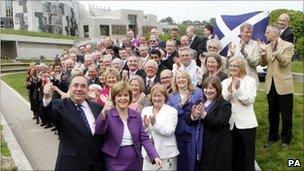What can Scots learn from Quebec's independence votes?
- Published

Alex Salmond intends to hold a referendum in the second half of the new parliament's term
As Scots contemplate a referendum on independence, Iain MacWhirter reflects on the experience of Quebec in Canada, which has had two such referendums since 1980.
The landslide victory for the Scottish National Party in Scotland in May this year has transformed politics north of the border and raised the prospect that, within a few years, Scots will be presented with a referendum on whether they want to remain part of the United Kingdom.
Scottish nationalists hope that any such referendum would deliver a resounding vote for independence.
Unionists hope it will be rejected and bury the prospect of independence for a generation.
But what happens to societies while they await the referendum which will allow them to decide their future?
Does living in the shadow of a referendum lead to economic uncertainty and stagnation?
Does capital flee, taking jobs with it? Or can a referendum be a galvanising force, energising civic society, engaging the electorate, (and exciting political journalists)?
Canadian perspective
Quebecers have been asked to vote twice in referendums on their constitutional future, in 1980 and 1995.

The Parti Quebecois was formed in 1968 to campaign for independence
Both times the sovereigntists (Quebec nationalists) lost out to the federalists (who want Quebec to remain within the Canadian federation), but the 1995 result was an extremely close 50.58% to 49.22%.
Visiting Montreal today, a visitor from Europe cannot help but be struck by the fascinating combination of cultural influences on the province.
Most people may be French-speaking but North American brands are everywhere.
The Queen's head is on the Canadian dollar (affectionately known as the "loonie" because it also bears the image of the loon bird). Restaurants which seem to have come out of the back streets of Montpelier or Nice are right next-door to branches of McDonald's (Le Big Mac, anyone?)
Many observers believe that demand for independence is on the wane, as a new generation of Quebecers come along who are more concerned with the state of the economy than the politics of identity.
Recent divisions within the Parti Quebecois and the defeat of the separatist Bloc Quebecois in the May federal elections (it lost all but four seats) might seem to indicate that the fight for independence is in a bad way.
But the sovereigntists are not giving up, and believe another referendum will happen.
In a suitably French Montreal bistro, I met Daniel Turp, a law professor and leading intellectual of the sovereigntist movement.
Turp has advised the Scottish National Party on strategy.
He told me: "I still believe Quebecers will come to a place where they realise independence is the right option for Quebec. We'll put the question to Quebecers and that time they'll vote yes."
'Economic uncertainty'
In a North American context, Quebec is something of an anomaly and not only because it is Francophone.
A province with a population of eight million (Scotland has five million), it has pioneered a form of social democracy with high welfare spending and universal child care.
But times have changed. It may not be so easy to stage a referendum in future, thanks to a landmark ruling by the Canadian Supreme Court that Quebec may not seek independence unilaterally.
Stephane Dion, the former leader of Canada's Liberal Party, is architect of the Clarity Act. That legislation established the conditions under which the government of Canada would enter into negotiations that might lead to secession following a vote by one of the provinces.
He warns: "It is very difficult to break up a modern state - economic uncertainty is inevitable."
The leader of the Parti Quebecois, Pauline Marois, still dreams of the day when Quebec will be able to take its own seat at the UN (perhaps a few seats away from an independent Scotland).
'Cultural confidence'
But to all intents and purposes - at least to an outsider - Quebec already has most of the trappings of independence, even while it remains a Canadian province.
And have 35 years of constitutional uncertainty damaged Quebec society?
Not according to Dr Ailsa Henderson, a Canadian who is now senior lecturer in social and political science at the University of Edinburgh.
She says: "I don't think it has been damaging at all. [Quebec] is an outward looking province… That barrier of language has in many ways protected it from the influence of Americanism that many provinces fear…
"It is more outward looking and culturally confident than other parts of the country."
But not everyone agrees that Quebec has been left unscathed by 35 years of constitutional uncertainty.
Federalists argue that the province has lost population and has fallen behind in terms of economic growth, relative to other Canadian provinces like Alberta.
But you do not find many people complaining on the streets of Montreal, which is a vibrant city of two million, with high-tech industries and formidable educational resources.
And there is one aspect of the Canadian experience that both nationalists and unionists in Britain might admire.
Despite the knife-edge vote on independence in 1995, there were no riots and no punch-ups, and sovereigntist and federalist Quebecers went back to work the next day as normal.
If it becomes that close in Scotland, will the same thing happen here?
Iain MacWhirter presents Waiting For Independence Day on Monday 25 July at 2000 BST on BBC Radio 4.
- Published7 June 2011
- Published8 May 2011
- Published26 November 2013